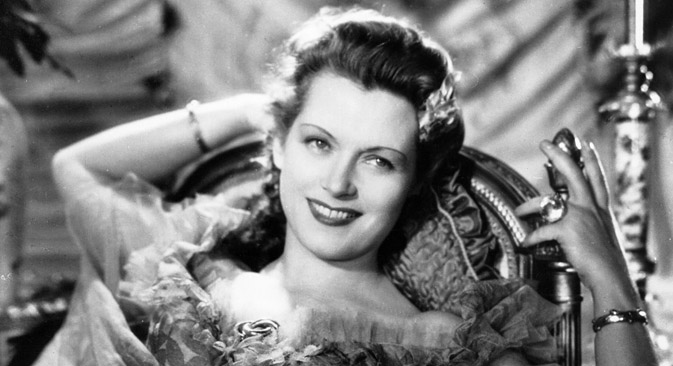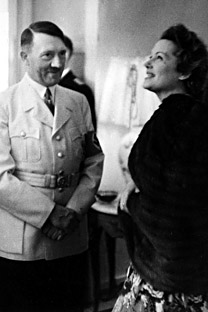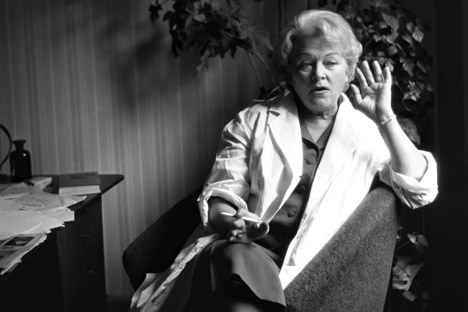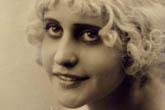Was Olga Chekhova a secret agent of the Kremlin?

Olga Chekhova acted in the best Berlin theatres and was not adverse to erotic roles. Source: Ullstein Bild / Vostock-photo
She received her name in honor of her aunt — the famous actress of the Art Theatreand wife of Russian playwright Anton Chekhov, Olga Leonardovna Knipper-Chekhova.
In fact, Olga was connected to the Chekhov family in two ways: Her first husband was Mikhail Chekhov, who was the nephew of Anton Chekhov.
Mikhail was an outstanding actor, director and teacher, who created an acting school in the U.S. attended by stars such as Marilyn Monroe, YulBrynner, Marlon Brando, James Dean and Paul Newman.
Olga was surrounded by famous people her whole life — actors, dictators, writers. And it all began when young Olga Knipper, who was attending lectures at Moscow Art Studio, was cast in a charity performance of “Hamlet.”
She played Ophelia, and Mikhail Chekhov played the prince. After the performance, an emotional Chekhov kissed Olga. It was such a passionate kiss, that she — being naive and inexperienced — seriously thought that she might become pregnant.
 |
| Chekhova and Hitler. Source: Ullstein Bild / Vostock-photo |
“Now we must get married,” she said. And they did marry, but in secret and in a small village. They only later confessed their marriage.
Olga was proud of her new name and never changed it, in spite of her numerous subsequent marriages and the fact thatit was highly controversial to carry a Slavic last name in Nazi Germany (where she later lived).
Olga and Mikhail’s marriage did not last long. After the revolution, Olga emigrated first, marrying a Hungarian film producer. After six years, Mikhail also emigrated.
Germany was a quite natural choice for an ethnic German, and so she moved there. But the circumstances of her departure are cloaked in secrecy — here we enter the realm of legends and tales.
According to one such legend, shortly before her departure, Olga was called to the Directorate of Military Intelligence, where she was recruited as a secret agent.
The actress was taught encryption techniques and was told about safe houses and secret codes. If this is true, then Chekhova has a predecessor in the world of espionage — the famous spy and actress Mata Hari.
There is a similar myth about the great Greta Garbo, as well. It is said that, during the war, Garbo was an agent for the Allies in Norway and Sweden, and that she even planned an attack on Hitler, for which she kept a gun in her handbag.
The recruitment of Chekhova has not been confirmed, but it has not been refuted either. Even without the espionage, there are plenty of dramatic twists in her biography.
Take, for example, the charming story of how she was on tour in America and made cabbage soup for Marlene Dietrich and Gary Cooper, latergetting them drunk on Russian vodka.
Chekhova was not a great actress, but she was always a professional. Still, with all her professionalism and talent, her chief asset was her sex appeal.
Related:
Cinematryoshka: first divas of Russian silent screen
In Anton Pavlovich’s footsteps: Chekhov’s Sakhalin 123 years later
One of Olga's mentors, Eleonora Duse, once said to her: “You should know — you have to walk onto the stage naked.” In her memoirs, “My Clock Runs Differently,” Olga wrote:“I didn't understand right away that she meant openness, nakedness of the soul on stage, and not a striptease.”
Not immediately, at least. Chekhova acted in the best Berlin theatres and was not adverse to erotic roles. She charmed the public. She charmed on the stage, from the screen and even more so in person.
Once she started making films, she quickly became one of the most popular actresses in Germany. “I came to America on tour,” she wrote, “with ‘Sex Olga’ as my nickname.” Yet she also had a reputation as a talented actress. She was even in a Hitchcock movie.
Altogether, Chekhova was in more than 100 films, including the legendary “Moulin Rouge.” She also performed on stage and even in performances directed by Max Reinhardt, who was the most significant German director of that era.
In the meantime, she played a different role on the political stage. Germany fell under the sway of the Nazis. Chekhova observed the political developments from her own point of view.
“There is no one in the entire Wehrmacht leadership that arouses any sexual feelings whatsoever, and I am a woman who is a little over 40.”
Her popularity was unusual. Her photo could be found in the Luftwaffe barracks and in soldiers' trenches. Hitler himself called her a state actress of the Reich.
The Nazi leader invited her to prestigious events and had her sit next to him, as a sign of his attention. She had affairs with Hermann Göring's flying aces and was friendly with Eva Braun — but all of this could have been a double life.
Olga’s position as a movie star gave her the perfect opportunity to obtain confidential information. It was rumored that Soviet intelligence had a plan to assassinate Hitler, in which Olga Chekhova would have played the primary role.
At the last moment, however, Stalin called off the plot, fearing that German generals would create a pact with England and America against the Soviet Union after the death of Hitler.
This story later became the basis for the iconic Soviet film,“Seventeen Moments of Spring.” If Soviet intelligence actually had an agent, who, like Shtirlits in “Seventeen Moments,” could identify the member of the Reich leadership trying to open separate negotiations with the Allies, it was Olga Chekhova.
Western journalists claim that Chekhova was the secret and well-informed source of informationwith whom the Swiss-based Soviet spy Sándor Radó maintained communications throughout the entire war.
This is all rumors and hearsay and has never been confirmed. However, when Nazi forces invaded Crimea, they did not touch the Chekhov Memorial Museum, while Tolstoy's home at YasnayaPolyana and Turgenev's home in Spasskoe-Lutovinovo were mercilessly burned to the ground. Tolstoy and Turgenev apparently did not have anyone to advocate for them in Berlin, and Chekhov, it seems, did.
At the end of the war, Olga was taken to Moscow. Chekhova was housed in a covert apartment, where she resided for about two months.

Olga Chekhova was not a great actress, but she was always a professional. Source: Ullstein Bild / Vostock-photo
Protective young officers were always around her, often playing chess with her. These same officers drove her to the Kremlin for talks with Beria and possibly with Stalin himself.
They even let her walk around the city. On one of these walks, a young girl ran up to Chekhova crying “Traitor!” and spit in her face.
And then an amazing thing happened: She was released. Chekhova, a favorite of Hitler! State actress of the Reich! This was a time when it was enough to have the smallest shade, hint, or suspicion of collaboration with the enemy, and people disappeared forever.
In addition, Soviet occupiers in Berlin did everything they could to make the Chekhov family comfortable. When Chekhova decided to move to Western Germany, she was not discouraged, but allowed to leave freely. It was unbelievable, as was much in her life.
She continued to act. After retiring from the stage and screen, she founded the Olga Chekhova Cosmetics company. She lived to a ripe old age.
She did not like to recall the war years, but she loved to talk about Chekhov. Each year, on the anniversary of Anton Chekhov's death, she traveled to Badenweiler, where “Uncle Antosha” died.
On March 9, 1980, knowing that death was near, Olga asked for her granddaughter and said: “When Anton Pavlovich Chekhov was in his last hours, he told Olga Leonardovna that he wanted to drink a glass of champagne. He drank it and died. I would like to follow his example.”
Chekhov told her granddaughter the shelf she should go to in the wine cellar, and the granddaughter returned with a glass for the dying woman.
After drinking the last sip of champagne in her life, Olga Leonardovna exclaimed, “Life is great!”
First published in Russian in the ITI-info journal (Journal of the International Theatre Institute).
All rights reserved by Rossiyskaya Gazeta.
Subscribe
to our newsletter!
Get the week's best stories straight to your inbox
